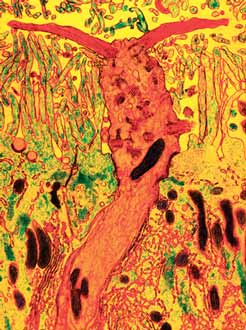Humans resemble molecules?
 Sense of smell (olfactory) is the most ancient. It is linked to a chemical feeling in bacteria: they are capable of sensing certain molecules of harmful or on the contrary, healthy substances and to move accordingly either to the molecule source or away from it.
Sense of smell (olfactory) is the most ancient. It is linked to a chemical feeling in bacteria: they are capable of sensing certain molecules of harmful or on the contrary, healthy substances and to move accordingly either to the molecule source or away from it.
In this regard, the difference between us and bacteria lies in the fact that we can only sense those molecules floating in the air and not those dissolved in water. However, before influencing the olfactory cells of the nose, those “scented” air particles have to dissolve in a thin layer of mucus of the olfactory epithelium.
The picture made by means of an electronic microscope depicts an olfactory cell in an epithelium of a man’s nose. The cell's “thorns” act as the main sensors. Such condition of being “on the verge of two worlds”, of organisms and environment, makes these olfactory cells very vulnerable. They perish each time we have a cold. That is why we temporary loose our sense of smell.
Even without taking into account various illnesses the overall amount of information that gets transmitted to the brain from the olfactory cells tends to decrease with age: approximately by 1% per year.
For some professions such loss can be of utmost importance. We do not simply mean those dealing with perfumes. According to Sherlock Holmes for instance, a good detective has to be able to distinguish at least 75 scents.
Subscribe to Pravda.Ru Telegram channel, Facebook, RSS!





